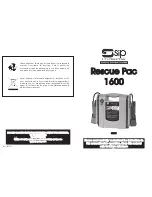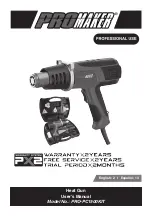
409- 10070
Rev D
6
of 8
To avoid damage to the dies, be sure that the moving and stationary dies are properly oriented.
8. Replace the battery and activate the power unit to allow the ram to return to the “down” position.
9. Pivot the yoke toward the latch arm until the locking flange secures the latch arm to the yoke.
Always make sure the yoke and latch arm are secured by the locking flange before cycling the tool to crimp the
product.
3.2. Removal of Die Assemblies
(Figure 2B)
To avoid personal injury, do not accidentally depress the trigger while removing the dies.
1. Pivot the latch arm away from the yoke to open the head.
2. Extend the ram until the ram setscrew is visible.
3. Remove the battery from the tool.
4. Loosen the setscrew in the yoke, and remove the stationary die.
5. Loosen the setscrew in the ram, and remove the moving die.
Figure 2
Latch Arm
Yoke Setscrew
2A
2B
Moving Dies Extended
Stationary Dies
Yoke Setscrew
Yoke
Ram Setscrew
4. OPERATION
4.1. Battery Installation and Removal (Refer to Figure 1)
The Batteries Directive 2006/66/EC introduces new requirements from September 2008 on removability of batteries
from waste equipment in EU Member States. To comply with this Directive, this device is designed to allow the
rechargeable battery pack to be easily removed by the end--user when it needs to be replaced.
To install the battery, slide the battery into the bottom of the crimp tool until it can go no further. There will be an
audible “click” of the battery lock to indicate that the battery has been properly installed.
CAUTION
!
CAUTION
!
DANGER
NOTE
i


























